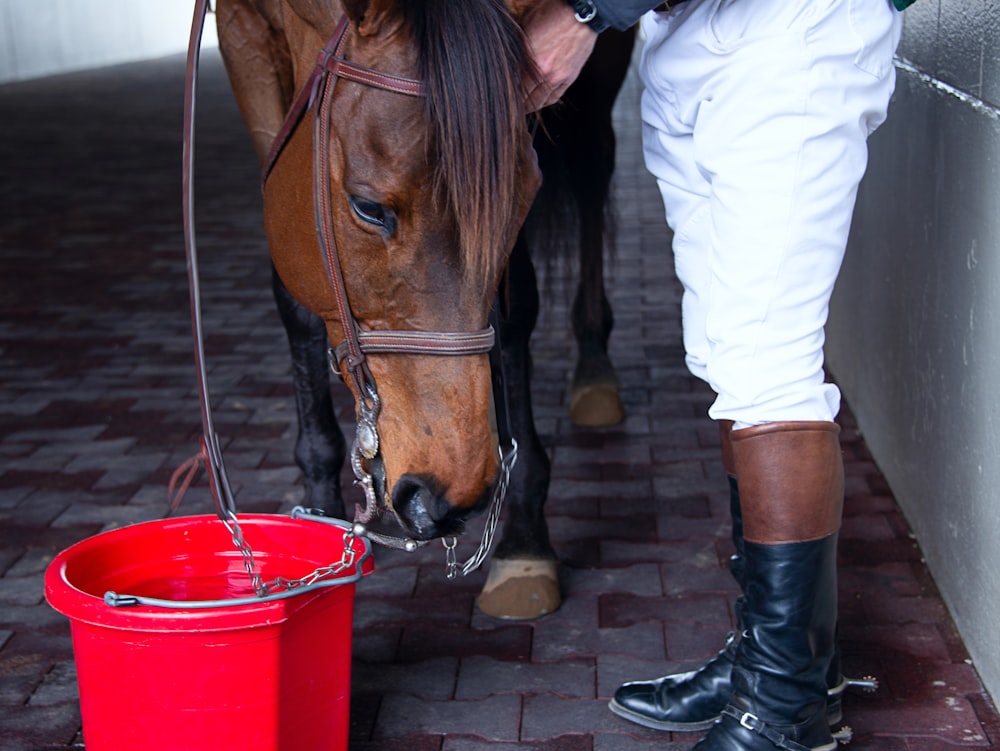
Here are a few ideas to keep your horse hydrated no matter its environment.
Why is Hydration Such a Big Deal?
Lack of fluids can cause higher heart rates and can lead to colic. Impactions can occur because there are simply not enough water and fluids to move things along in the horse’s digestive system. Horses can stop drinking for MANY reasons including:
- Their source of water is frozen over
- Other horses may “guard” the water or chase them away,
- Their water is dirty or contaminated
- Extreme heat can dehydrate horses faster than they can replenish their fluids
How Do I know if My Horse is Dehydrated?
There are a few ways to check if your horse is dehydrated. First, if your horse is acting “off,” or seem extra lethargic, this may be a warning sign something is wrong. Your horse’s gums can provide the answer too. If the horse’s gums are dry or “tacky” it is a sign of dehydration.
Try pressing a finger on your horse’s gum line and see how long it takes for the pinkish color to return. If the color is slow to return your horse needs more fluids.
One of the most common ways to check your horse’s hydration is the simple “pinch” test. On your horse’s neck or shoulder area, pinch together the skin and see how long it takes for the skin to fall back into its normal state. A dehydrated horse’s skin is slow to flatten back out. A hydrated horse’s skin will return to its flattened state immediately.
 Summer Tips for Hydration
Summer Tips for Hydration
Summer heat can make your horse sweat more. Adding electrolytes to their feed is a good way to help replenish what they have lost. Look for sugar-free electrolytes for horses and add the recommended dosage to their feed.
During the hot summer months, another way to keep your horse hydrated it to make sure their water source is clean. Algae, bird feces, and other contaminants can dirty your horse’s water, making them less likely to get the water intake they need.
Cleaning out the water trough or waterer at least once a week will give your horse the clean, fresh water they want. Providing more than one water source can encourage horses to drink more often with the treat of less competition at the water source.
Winter Tips for Hydration
One of the biggest challenges in the winter is keeping your horse’s water thawed. Frozen water troughs and buckets are a pesky issue for those that live in cold climates. Make sure to check your horse’s water source and break any ice. There are LOTS of buckets, waterers and troughs that have heating elements. Thes can be used to heat the water temporarily to keep the ice thawed.
Look for heating elements that have an auto shut off, and that are contained within the casing of the bucket or trough are at the bottom of the bucket or trough. If horses can reach the heating element or cord, many will try to pull on it or play with it. It is best to get items that are “horse proof” in which they cannot find or touch the heating elements.

Try adding water to your horse’s feed. This can be done both in winter and summer, and it is a great way to get the powdered electrolytes to mesh with your horse’s grain.
Most grain only needs a little water and a few minutes to soak, but some may take longer – it will take some meddling to determine how much water and for how long. Warm water can be used in the winter to add to your horse’s grain to make a nice mash for them to enjoy.
Hydration is key in equine health. A simple pinch test or an inspection of your horse’s gums can be done daily to stay on top of your horse’s hydration.
If your horse seems unable to move freely about or seems in distress, contact your vet immediately – they can give your horse and IV and the fluids they need to recover their hydration.
Other Content You Might Like:
Ingredients in Horse Joint Supplements and How They Can Help
7 Benefits of Coconut Oil for Your Horse
Common Horse Skin Problems
How To Sharpen Your Own Clipper Blades